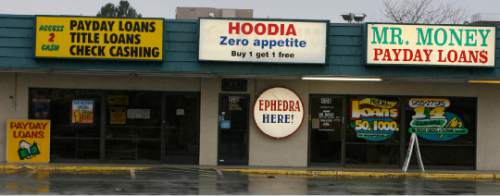This is an archived article that was published on sltrib.com in 2016, and information in the article may be outdated. It is provided only for personal research purposes and may not be reprinted.
Utah has lax regulations of the payday lending industry and state regulators are failing to do their job in enforcing the rules, according to a new legislative audit that recommends significant changes to the way the industry is governed.
The audit found that borrowers and lenders are gaming the system to find ways around a 70-day limit for extending payday loans, with borrowers frequently opening new loans the day others are closed.
Regulators at the Department of Financial Institutions (DFI) said the practice was improper and a violation of the law. Indeed, DFI identified 244 violations in 2015 alone, but the agency will not levy a fine until the same violation has been identified for three consecutive years.
The agency has issued just one fine in the last five years, even though auditors found seven lenders who have been in violation for the three-year span.
"That surprised me, that DFI has been so lax, according to the audit, on doing their job … to see DFI just kind of let things slide," said Rep. Brad Daw, R-Orem, who requested the audit.
The state has 63 registered payday lenders that operate out of 184 storefronts. In addition, many lenders operate online. The report estimates that the lenders serve as many as 120,000 customers each year and that an average customer will get 4.3 loans annually for $370 each, paying interest of $584 over the year.
Auditors found that 32 percent of payday borrowers are "chronic" users of the service, often getting extensions on their loans or rolling one loan into the next, racking up $1,248 in interest annually. Another 14 percent of the sample group was in default, meaning nearly half of all payday borrowers were swamped with the debt.
One borrower took $662 in loans, rolling them over for eight months before ultimately paying $3,000 in interest.
In 11 percent of cases, lenders issued multiple loans to the same customers, and in some instances issued loans to customers who had already defaulted on previous payday loans or were facing court actions for defaulting on loans.
Not surprisingly, many of the borrowers were low-income residents struggling financially — often including medical debt.
"For example, many payday loan customers have had small claims cases filed against them by their medical care providers. This anecdotal evidence suggests that many users of payday loans are facing difficult financial challenges," said the audit.
The report notes that in June the federal Consumer Financial Protection Bureau issued new proposed rules on the payday lending industry that industry officials have said would essentially wipe out payday lending, or at least dramatically scale it back.
Auditors said that 54 percent of customers use the short-term loans responsibly and "we believe any new regulations should avoid limiting access to payday loans by these customers."
"Instead, the Legislature should consider adopting a set of new laws aimed at preventing the misuse of payday loans by the remaining 46 percent of customers," auditors wrote.
The state should consider creating a centralized database so lenders can see when customers have borrowed money, if they have defaulted and what loans might be outstanding. Lawmakers could impose limits on how many loans can be outstanding at any time, prohibiting lenders from rolling over old loans, and by requiring a "cooling-off period" between loans.
Regulators could also spend more time ensuring lenders comply with the 70-day limit on the loans rather than wasting time verifying the interest rates charged by the lenders, which the audit says does little good.
Daw, who has been fighting for tougher regulations on the payday lending industry for years — and was targeted and defeated in one election by a shadowy political action committee funded by payday lenders — said he hopes the data in the auditors' report motivates his colleagues to take action to protect consumers.
But he remains uncertain how much progress he will be able to make.
"I'd like to say I was optimistic. I'd like to believe that this report, which is not just me saying it … it's not somebody who can be dismissed saying this, now it's a legislative audit going in and getting the actual data from the lenders and combing through it," Daw said. "So my hope is that will be enough to really do something this time."
Twitter: @RobertGehrke





